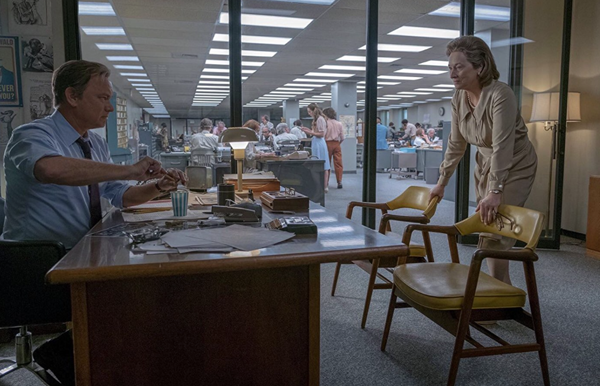
I’ll be honest: I think The Post was over-hyped. How could it not be, though? With two of the most iconic actors of the 21st century onscreen together in a film directed by the man widely considered to be the most influential director in the history of Hollywood, it’s hard not to hype this one up to 11. Don’t get me wrong: The Post is a good, enjoyable and important film. It takes a naturally dramatic event and portrays it as exactly that. Meryl Streep and Tom Hanks are as charming as you would expect them to be together, and their tandem screen time was easily the best part of the film. But, that does not change the fact that this film falls apart in the final 20 minutes. Nor does it change the fact that a crucial subplot is not resolved in any way. It also does not change the fact that after such an energetic and dramatic setup, the film just, kind of . . . ends.
While neither Hanks nor Streep put in necessarily standout performances, it is still marvelous to see these two iconic actors onscreen at the same time. This is reminiscent of the 1951 film The African Queen, which paired Humphrey Bogart and Katharine Hepburn for the only time in their respective and legendary careers. The Streep/Hanks pairing alone will sell tickets, and I am okay with that, because this story is just as relevant in today’s world as it was in the early 1970s.
As a media nerd myself, I loved almost every second of this film. I loved the “bedlam” (as executive editor Ben Bradlee, played by Hanks, would describe it) we got to see in the newsroom, and while journalists frantically sorted through 4,000 pages of government secrets in Bradlee’s house as his wife (played by Sarah Paulson) served sandwiches. I loved seeing Bob Odenkirk go after his source for the Pentagon Papers in a way that would make Saul Goodman proud. This is a two-hour movie, but the middle of it flew by with tense scene after tense scene. However, this film makes a big mistake, and it centers around the decision-making process of its central character, the newspaper’s publisher, Kay Graham.
Graham inherited the Washington Post from her husband (who inherited it from her father) after he committed suicide. For decades, WashPo was a little family paper headquartered in Washington D.C. that was, like everyone else, chasing the New York Times for the next big story. Now, this film does a brilliant job showing the paper’s staff grappling with the consequences of publishing the Pentagon Papers. However, Graham (Streep) has the final say on whether the papers are published or not, and she comes at this decision from a very different (and reasonable) angle. While Bradlee and company are deciding whether they should publish for fear of putting U.S. troops in harm’s way, Graham is risking the newspaper itself because The Post was also doing its initial public offering (IPO) at the same time as it was publishing the Pentagon Papers. And, as this film reminds us multiple times, there is a clause in the IPO that allows the “bankers” of Wall Street to pull out of the IPO within a week of its initial offering due to a dramatic event. This risk is at the crux of her decision making.
Unfortunately, this debate isn’t resolved at all. After grappling with this risk for the vast majority of the movie, we don’t get even a single scene of fallout from the IPO side of the paper. No shot of its stock tumbling (or soaring). Nothing. And, because they make this the central focus of Kay Graham’s character arc, it kind of made her irrelevant to the entire story. While this is the only major issue I have with The Post, having your top-billed actress be relatively inconsequential to the events of your story is something of a major problem!
I only had a few other minor issues with this film; I wish the dialogue had been smarter. Maybe it’s just because I’ve seen The Newsroom, but I really wish Aaron Sorkin had been the screenwriter for this movie. The ending overall was also very rushed, but I can hardly fault the film for that. I mean, you know what’s going to happen, so when you see the thing happen . . . how dramatic can it really be?
Still, The Post is a good movie with an engaging and dramatic story, and the top-tier level of acting you’d expect from a film that puts Meryl Streep and Tom Hanks on the same screen together, with a strong supporting cast to boot. But if you’re looking for a truly compelling and dramatic film on media and journalism, go back and watch 2015’s Spotlight.













